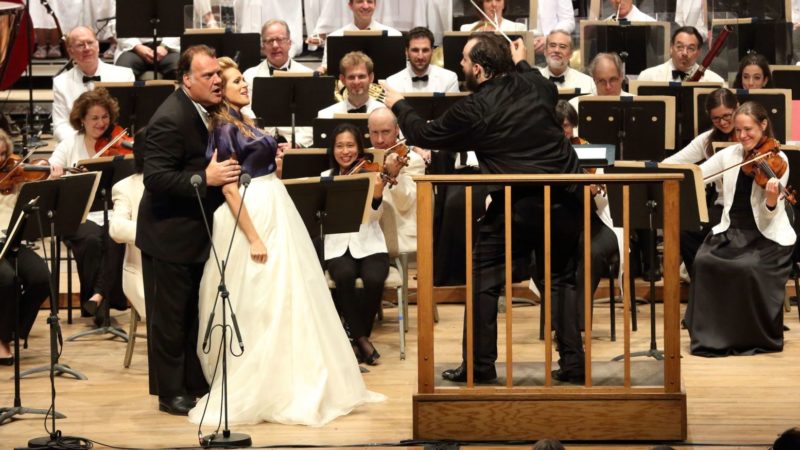| August 28, 2017


| August 28, 2017

“… Opolais was a triumph in the title role, showcasing her talents with flexibility not just as an actress, but also vocally. From her first entrance off stage, one heard Opolais’ glowing voice over the immense chorus as she sang the cantata. Then came her show-stopping “Vissi d’arte” and that was a true display of vocal fireworks as Opolais sang with a sense of desperation, moving the tempo forward, all while lying on kneeling on the floor. It was a true plea as the voice continuously crescendoed until it rose to a true forte in the words “Signor” hitting the high B flat perfectly.
Moreover, her chemistry with Bryn Terfel was unmatchable. From the start of the act, the soprano showcased strength, mixed with some fear and loathing for Terfel’s villainous interpretation. When it came time for her vocal outcries, she didn’t care to make it ugly and raw, emoting some of the text. It only made Tosca’s desperation seem more vivid and real. And when Terfel fawned all over her, she had no qualms with pushing him away in the small little space. But the clincher came when Tosca kills Scarpia. Opolais’ face was filled with fear, but as Terfel moved toward her, she took the knife and stabbed him the neck. Her voice was full of power as she sang her final lines triumphantly.
Terfel, of course, held his own against her, making the battle of wills all the more visceral. At the beginning of the concert, he walked on stage, already in character sipping his wine. This was an ominous Scarpia who meant business. There was a gritty quality to his timbre but at the same time, he kept a suave tone that allowed audiences to see and hear the manipulative character. And that was even more evident as he grabbed Opolais’ Tosca, looming over her and emphasizing his lust for her through the text. Anytime Terfel approached Opolais it was like a wolf seeking his prey and any sexual advances he could make, he did.
It is a shame U.S. audiences won’t be seeing these two in a full production of “Tosca.” One could only imagine how riveting these two would be in the complete opera …
The second half of the concert was dedicated to showcasing Terfel and Opolais and the BSO, as well as the Tanglewood Festival Chorus …
In her first selection, the “Song to the Moon” from “Rusalka,” Opolais showcased a creamy voice with each phrase melting into the next, creating a mystical atmosphere. The connected phrases blended well with the orchestra as Nelsons conducted with a sturdy and quick pace that brought through the Slavic tones of Dvorak.
Her “Summertime” from “Porgy and Bess” saw the soprano’s higher register shine. It also displayed how easily Opolais adapted to the jazzier style as she sang with a free-flowing legato, her voice almost swaying. As for Bryn Terfel, it was hard to look away …
At the end of the concert Terfel and Opolais reunited for the duet “Bess, you is my woman now.” The two showed tremendous chemistry yet again, this time flirting instead of killing each other. Opolais first rejected Terfel but eventually took to his advances, her expressive face telling us everything. Their voices matched with each line as the swooning orchestral lines crescendoed and they phrased the music with gusto. Opolais’ soft and smooth tone was a great contrast to Terfel’s gruffer timbre.
Once they finished, it was obvious the audience wanted more. And they got just that.
Opolais and Terfel encored with “La Ci darem la Mano.” However, this time around Nelsons joined in. Terfel’s tone now smooth and gentle made advances on Opolais as he tried to seduce her with his beautiful voice. And Opolais showed a gentle tone as she flirted with him. But at one point, Nelsons joined in and a sang a few lines. And when Terfel was unable to seduce her, he kicked Nelsons off the podium and began conducting. Opolais and Nelsons looked astonished but they continued singing the duet. Eventually, the Maestro took back the podium and Opolais and Terfel sang through the rest of the duet. At the end when Terfel sang the lines “Andiam,” the soprano looked confused where to go. But she made her choice and while Terfel left the stage she embraced her husband Nelsons. The moment produced laughter throughout the audience and it is was also the best way to end a delightful summer concert.
Ultimately, the Opera Gala was a delightful evening filled with drama, laughter and simply put amazing music-making.
It also left wondering about what could have been this New Year’s Eve.”
“… her voice carried through, from her soaring offstage hymn at the beginning to her throaty, desperate pleas for Cavaradossi’s life near the end. Her unwieldy long gown seemed apt for a woman trapped. And after stabbing Scarpia, she didn’t waste time with prayers over his body as the stage directions dictate; she grabbed her dropped wrap and didn’t let her dress trip her on her way out.”
Zoë Madonna – Boston Globe
“Opolais gave a spirited performance of the title character from this timeless, tragic opera … Opolais then took center stage and gave a tender rendition of the famous “Song to the Moon” aria from Act 1 of Anton Dvorak’s opera “Rusalka.”
Ken Ross – MassLive
“The glue holding the thing together was the starry duo of Kristine Opolais and Bryn Terfel as soloists, first battling it out as Tosca and Scarpia, later crooning and swooning as Bess and Porgy. In a single encore, they turned themselves into Giovanni and Zerlina in a hammed-up, kissy-faced version of L ci darem la mano” from Mozart’s “Don Giovanni.” Ah, but the real-life husband got the last word and kiss. After a mock scuffle with Terfel at the podium, the conductor walked happily off the stage with his wife. Cue wild cheering. Cue good night.”
Hilary Scott – The Berkshire Eagle
Image: Boston Symphony Orchestra
November 5, 2025
Roderick Cox, conductor Kristine Opolais, soprano Mika Kares, bass